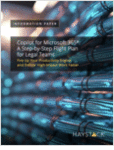The criminal fraud trial of three former executives of Dewey & LeBoeuf this year cast a spotlight on an arcane, often tedious but essential part of the operations of any big law firm: accounting practices.
After hours and hours of testimony, jurors and observers alike were left in a fog of confusion about all the adjustments that the failed firm made to boost the income shown on its books. Jurors deadlocked on the most serious charges, while observers wondered if these financial maneuvers were legal, let alone appropriate.
This content has been archived. It is available through our partners, LexisNexis® and Bloomberg Law.
To view this content, please continue to their sites.
Not a Lexis Subscriber?
Subscribe Now
Not a Bloomberg Law Subscriber?
Subscribe Now
LexisNexis® and Bloomberg Law are third party online distributors of the broad collection of current and archived versions of ALM's legal news publications. LexisNexis® and Bloomberg Law customers are able to access and use ALM's content, including content from the National Law Journal, The American Lawyer, Legaltech News, The New York Law Journal, and Corporate Counsel, as well as other sources of legal information.
For questions call 1-877-256-2472 or contact us at [email protected]





